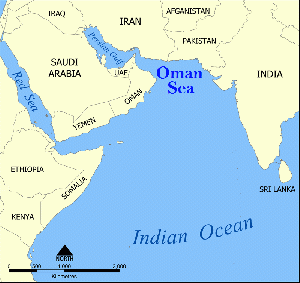I have lived in Salalah, Oman for nearly 4 years now with my family. Earlier, I had lived in Kuwait (2004-2009) while the Iraqi Civil War under American Occupation was ongoing, so I am sort of less jumpy than others here about what has been going on in Yemen since the 19th of March 2015, when Saudi Arabia intervened fully in the Yemeni Civil War. That does not mean that I don't take the issues of war less seriously than others. I question the prevalent local Omani attitude that the war in Yemen will only affect Oman when a large number of refugees arrive on our borders some months from now.[tag]
Let me describe in part 1 of this article what life is like here in Salalah, Oman--which had itself been at the epicenter of war from the late-1950s and mid-1970s. That civil war has been called simply the Dhofar Insurrection, but was actually a prelude both to (1) the end of communism in the cold war era and a prelude to (2) the tribal and religious wars that the rest of the Middle East has since faced.
The insurgencies in Oman from 1959 to 1976 have been followed by an unprecedented peaceful developmental period in Oman. This period is even boldly called here the Omani Renaissance. However, every living Omani from those two decades of war and poverty has since taught their children to prepare for war but to live for and to expect peace.
Until recently (pre-2014), the borders between Oman, Yemen have been relatively porous. This is because huge tribes, especially the al-Mahri family, live on all sides of the Saudi and Yemeni borders of the Dhofar (of which Salalah is the capital city) region. This sense of family leads most here in Salalah area to recognize that the familial tribes on both the Yemeni and Saudi border will oversee peace in the region and will see to it that the other Yemeni insurgents, like the Houtis in 2015, stay in Yemen--far away from the Dhofar, Oman border.
THE DAYS IN OUR LIVES IN DHOFAR
I just dropped my daughter off at her elementary school for her very first day of Kindergarten (UKG) here in Salalah. I was prepared to greet and shake her teacher's hand, but I discovered that her new teacher's name is Aminah and that she had her head covered in a manner which indicated she was Muslim. In the Middle East--and especially so in conservative Oman-- a male does not offer his hand to a Muslim woman to shake in greeting, i.e. unless the woman offers to do so first. So, after greeting Teacher Aminah verbally and saying good-bye to my daughter, I proceeded to get back in my car and drove to my office to work.
Sometimes, after my work, I drive to the Crowne Plaza Hotel and Resort where I am a member of the Crowne's gym and pool facilities. Just after Saudi forces began bombing Yemen last month, I swam in one of the swimming pools among many newly arrived Americans--some who I assumed were security personnel for the USA working in Oman--or recently evacuated ones from Yemen.
Meanwhile, as Easter holidays are now-ongoing, many Germans, Italians and other Europeans have since refilled the pools and seaside of the Crowne Plaza here in Salalah--despite the ongoing war in neighboring Yemen.
The German travel agency FTI calls Salalah, the "Arab Karibik" or Arab Caribbean.
On Easter Monday, I held an extensive conversation on the topic of the "Omani Renaissance" at the hotel with an interested German tourist. FTI flies with Sunexpress and other airlines to the Middle East. One flight with FTI arrives weekly to Salalah and Europeans sun and tour here--less than 90 kilometers from the Yemeni border--even as the Saudization of the Civil War in Yemen has erupted. This week also a cruise ship arrived in Salalah on its regular visit to Dhofar.
One of the places where one can go to meet a lot of long-term Yemeni citizens here in Salalah is at the Ramez Shopping Center. It is a Yemeni owned store--and most of the workers there are Yemeni. Salalah's Ramez has a large children's play area which my daughter loves to play at.
Most Yemenis at Ramez Shopping Center and at the college where I work are naturally concerned about the war in Yemen and the large scale bombing taking place there now. However, they, too, feel their families here in Salalah are relatively safe.
The only peoples in Oman who are vocally nervous about the war in Yemen more adversely affecting Oman directly are those who have recently fled another country in civil war. For example, my friends from Syria are very nervous about the ongoing events in Yemen since the Saudi expansion into civil war there. These Syrians know war from in and around Homs and Damascus. Their families are affected by war. Some have lost their homes in Syria. Many have emigrated to Oman and other GCC countries in recent years.
In contrast, in my Salalah neighborhood, which consists mostly of Omanis, a sense of peace and expectation for continued peace is witnessed and almost ever-present. The Omanis I talk to include those most recently retired from the Omani armed forces but who still keep up on border control reports all of the time through their own contacts.
(Note: You can view every article as one long page if you sign up as an Advocate Member, or higher).





